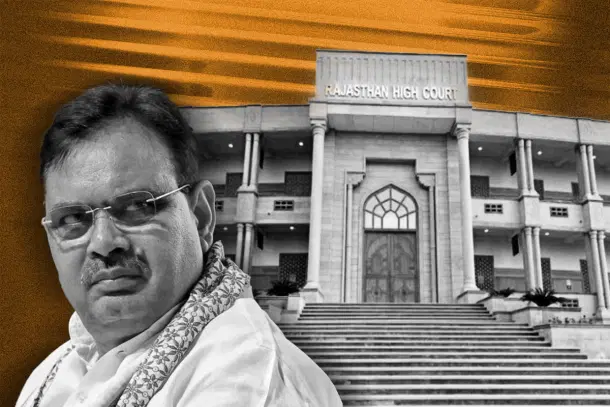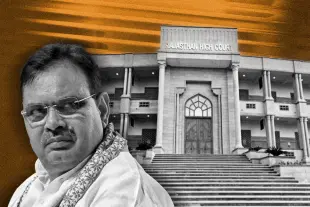States
Bhajan Lal Sharma's Missed Moment: Rajasthan High Court Cancels SI Exam Over Corruption
Nishtha Anushree
Aug 30, 2025, 11:00 AM | Updated 11:00 AM IST
Save & read from anywhere!
Bookmark stories for easy access on any device or the Swarajya app.


Despite making many efforts to eradicate irregularities in the Rajasthan sub-inspector (SI) recruitment examination 2021, the Bhajan Lal Sharma government failed to bring it to a fruitful conclusion.
It was only after the Rajasthan High Court (HC) judgment on Thursday (28 August) that the SI recruitment exam was declared cancelled on grounds of systemic and widespread paper leaks.
Notably, the SI paper leak was a major political issue, among other paper leaks, in the run-up to the Rajasthan Assembly election 2023. The Bharatiya Janata Party (BJP) aggressively campaigned against the then Congress government.
Consequently, the Congress lost and the BJP formed the government, with Sharma becoming the Chief Minister (CM). As promised in the BJP manifesto, Sharma formed a Special Investigation Team (SIT) to probe the paper leak cases within days of assuming power.
The SI recruitment exam was conducted by the Rajasthan Public Service Commission (RPSC) for 859 posts, with nearly 7.97 lakh candidates appearing in September 2021. Despite allegations of irregularities, the paper leak was never accepted by the then Congress government.
It was only after the Special Operations Group (SOG) arrested trainee SI Daluram Meena in February 2024 that a statewide paper-leak operation involving criminal mafias, RPSC insiders, and corrupt exam officials was uncovered.
The Government Action
So far, the SOG has arrested over 120 accused, including 54 trainee SIs. Along with them, several exam brokers, solver gangs and complicit officials, including two former RPSC members, were also arrested.
The first high-profile arrest was that of Ramu Ram Raika, a former RPSC member, in September 2024. His children, Devesh and Shobha Raika, both allegedly benefited from the leaked papers.
Another former RPSC member, Babulal Katara, who was already under arrest for the 2022 Second Grade Teacher Recruitment exam paper leak case, also came under the SOG's radar for allegedly initiating the SI paper leak.
While the police action continued, the government formed a sub-committee led by Rajasthan's Parliamentary Affairs Minister Jogaram Patel on 1 October 2024 to decide whether the SI exam should be cancelled.
This was under the pressure of Agriculture Minister Kirodi Lal Meena, who had been demanding the cancellation of the SI exam for a long time. However, the recommendations of this sub-committee were not made public then.
In December 2024, some media reports suggested that the sub-committee had recommended cancelling the exam, while others clarified it had merely presented details of the irregularities without making any recommendation.
Nonetheless, the recommendation to cancel the exam came from ADG V K Singh of the SOG, who headed the paper-leak SIT, as well as from the Rajasthan Police Headquarters, and was subsequently accepted by the Home Department. The RPSC also supported it.
Despite these recommendations, the Bhajan Lal government did not cancel the exam as the matter had reached the Rajasthan HC by then. However, the CM worked on making the future RPSC exams watertight by restructuring and strengthening the institution.
The RPSC strength was increased from seven to 10, excluding the Chairman, in July. The institution also got a powerful leadership, in the form of a serving Director General of Police (DGP), for the first time, Utkal Ranjan Sahoo, in June.
The Court Proceedings
The first petition was filed by candidates in the Rajasthan HC more than a year ago, alleging widespread irregularities. Another group of candidates, led by Kailash Chandra Sharma and including 175 others, filed a petition in the Rajasthan HC in November 2024 seeking cancellation, citing arrests and ongoing investigations.
In response, the Rajasthan HC issued a status quo order halting the appointment and postings of selected SI candidates. In February 2025, the HC asked the Rajasthan government to decide within two months whether to cancel the exams.
However, the government kept missing multiple extended deadlines. It was only on 1 July that the Rajasthan government informed the court through the Advocate General that it would not cancel the 2021 SI recruitment.
The Cabinet sub-committee and the Chief Minister’s Office supported this decision, reasoning that only 6.3 per cent of candidates were implicated in wrongdoing. They argued it would be unjust to penalise the rest, and proposed compensatory measures such as increasing posts and offering age relaxation in the next recruitment cycle.
The government even claimed that the SIT was in a position to segregate the tainted and untainted candidates and hence, cancelling the entire exam would be "a premature decision."
In the subsequent hearings, the court criticised the government for its delayed responses, failure to share investigative findings by the SOG and its inconsistent stance. The court asked what would happen if more implicated candidates were identified, underlining the need for transparency and preparedness.
The court reserved judgment on 14 August and pronounced it on 28 August.
The court noted, "Committees formed by the government and the SIT confirmed that the fraud was systemic," and highlighted the role of arrested RPSC members in the paper leak, raising more concerns over the sanctity of the process.
The HC suspected that the leaked papers were widely distributed and even the interview stage was manipulated, making it "practically impossible to separate genuine candidates from those who benefited from corruption."
Considering the SI recruitment as "a highly sensitive matter linked with law and order," the court noted that "retaining the recruitment would mean legitimising large-scale corruption," and hence, it was "just and fair" to scrap the entire SI recruitment exam 2021.
The Missed Opportunity
In light of these developments, it can be said that all the groundwork for the cancellation of the SI exam was laid by the government itself, and the court merely gave a verdict based on the evidence provided by the government.
It was the Bhajan Lal government that formed the SIT, SOG and the sub-committee to probe the paper leak. It took all the strict action, including arrests and identification of corrupt candidates, that was needed to eradicate the irregularities.
It also took future-proof measures, like restructuring the RPSC through strengthening and leadership changes. Yet, the Bhajan Lal government's inability to take a bold decision to cancel the exam has cost it all the credit.
Since the exam was conducted under the erstwhile Ashok Gehlot-led Congress government and this was a major electoral issue, Sharma could have easily scored much-needed political brownie points, given his political inexperience, by cancelling the exam.
Yet, he not only let the opportunity slip but also tarnished his government’s image with a lackadaisical approach during the court proceedings, where it faced repeated rebukes for indecisiveness, delayed responses, and inconsistent stands.
It is possible that the Bhajan Lal government was genuinely interested in safeguarding the interests of honest candidates and hence defended the exam in court. However, a few political observers believe that Sharma just wanted to play it safe, not inviting the ire of the selected candidates.
Other suspected reasons are that under the pressure of the bureaucracy, Sharma wanted to avoid the troubles of going back to square one: re-notifying, conducting prelims, mains, interviews, and training afresh and preventing delays in police recruitment.
Whatever the reason might be, for now, the Rajasthan HC appears taller than Sharma in safeguarding the sanctity of the government recruitment exams, denying Sharma an opportunity to emerge as a popular and bold leader in the state.
Nishtha Anushree is Senior Sub-editor at Swarajya. She tweets at @nishthaanushree.




